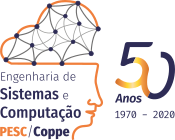Sincronização de Tempo e Alocação de Recursos em Sistemas da Internet das Coisas
Authors:
Autores
| Person role | Person | |
|---|---|---|
|
6958 |
135,3097,3098
|
|
|
6957 |
135,3097,3098
|
|
|
6959 |
135,3097,3098
|
Informations:
Pesc publication
O paradigma da Internet das Coisas (IoT - Internet of Things) consiste da inter-conexão dinâmica de objetos autônomos a fim de estender a Internet para o mundo f??sico. Para atender os requisitos das aplicações, arquiteturas da IoT separam o sistema em três n??veis: n??vel das coisas, n??vel da borda e n??vel da nuvem. Cada n??vel deve fornecer serviços de infraestrutura que ajudam a alavancar o desempenho das aplicações ao mesmo que devem ser eficientes. Nesta tese, dois problemas da infraestrutura de sistemas da IoT são abordados: a sincronização de tempo no n??vel das coisas e a alocação de recursos no n??vel da borda. A sincronização de tempo é o serviço de infraestrutura que visa manter todos os nós com uma visão comum o tempo. A escolha do nó de referência, aquele que fornece o relógio de referência, é uma estratégia que pode mitigar o erro de sincronização entre os nós da rede. Nesta tese, foi proposto um algoritmo distribu??do de sincronização de tempo eficiente energeticamente que visa selecionar o nó que minimiza sua distância para os demais nós da rede. Esse algoritmo orquestra a configuração de temporizadores nos nós sensores, gerando o mecanismo de seleção do nó de referência que não necessita do envio adicional de mensagens de sincronização. A alocação de recursos no n??vel de borda visa escolher os recursos f??sicos e virtuais dispon??veis para uso das aplicações. Nesta tese, é proposto um novo algoritmo distribu??do de alocação de recursos que suporta a heterogeneidade das aplicações e dos dispositivos da camada das coisas. O alocador de recursos explora a natureza descentralizada do n??vel de borda, promovendo a colaboração no processo de alocação. Ele também fornece um eficiente uso de recursos ao mesmo tempo que atende os requisitos de latência, heterogeneidade e frescor de dado das aplicações da IoT, respeitando suas diferentes prioridades.
The Internet of Things (IoT) paradigm consists of the dynamic interconnection of autonomous objects in order to extend the Internet to the physical world. To meet application requirements, IoT architectures separate the system in three tiers: things tier, edge tier and cloud tier. Each tier must provide infrastructure services that help to leverage the applications performance while being efficient. In this thesis, two problems of the IoT systems infrastructure are addressed: the time synchronization on things tier and the resource allocation in edge tier. Time synchronization is the infrastructure service that aims to keep all nodes with a common view of the time. The choice of the reference node, which provides the reference time, is a strategy that can mitigate the synchronization error between the network nodes. In this thesis, an energy-efficient distributed time synchronization algorithm was proposed that aims to select the node that minimizes its distance to the other nodes in the network. The algorithm orchestrates the configuration of timers on sensor nodes, generating a mechanism for triggering the selection of the reference node without additional synchronization message exchanges. The resource allocation at the edge tier aims to choose physical and virtual available resources for use by the applications. In this thesis, a new distributed resource allocation algorithm is proposed that supports the heterogeneity of applications and devices of the things tier. The resource allocator explores the decentralized nature of the edge tier, promoting collaboration in the allocation process. It also provides an efficient use of resources while meeting the latency, heterogeneity and data freshness requirements of IoT applications, respecting their different priorities.



